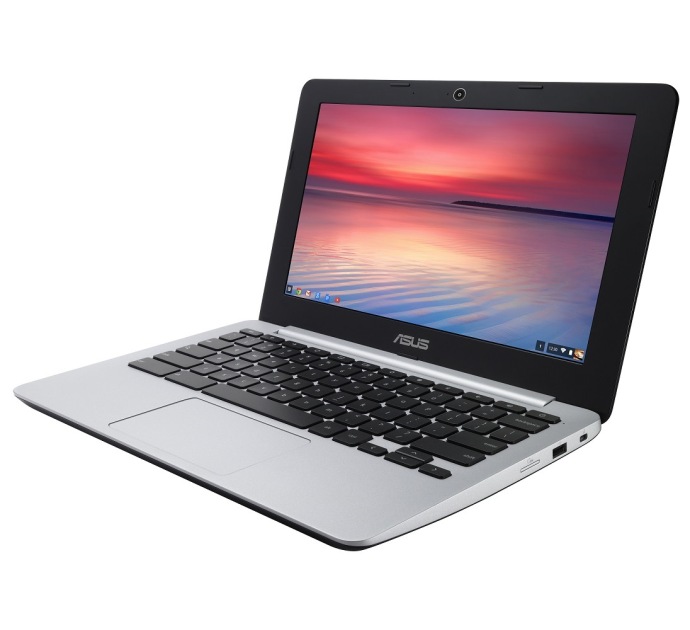
[ad_1]
Intel and Google on Tuesday joined several partners in launching a variety of new Chromebooks and Chrome-based desktop systems powered by 4th-Generation Core i3 and “Bay Trail M”-class Celeron mobile processors, as well as entry-level Haswell-class desktop chips.
Acer, Asus, Dell, Hewlett-Packard, Lenovo, LG Electronics, and Toshiba joined Intel and Google at a press event in San Francisco to introduce their next-generation Chrome OS-based laptops and other Chrome products, including several fanless Chromebooks sporting the new Celeron processors and promising up to 11 hours of battery life.
Google, meanwhile, announced a new Chrome app called Play Movies which will let Chrome OS users watch movies and TV shows available through Google Play offline as well as online. Play Movies will be released in “a few weeks,” said Caesar Sengupta, vice president of product management at Google. The Internet giant will also be adding Google Now support and voice-based functionality to its Chrome operating system in the coming days, he said.
“We have been involved with Google from Day One with Chrome OS,” said Navin Shenoy, vice president and general manager of Intel’s mobile computing group. “We are now in our fifth generation of Chrome devices and our processors remain the only ones to support the 64-bit version of Chrome OS. We have a great working relationship with Google and we will continue to invest in Chrome OS.”
Shenoy said new Bay Trail M-based Chromebooks from Asus represent the first fanless Chromebook designs and the first to provide such lengthy battery life between charges. Built on Intel’s latest low-power Celeron SoCs, the Asus C200 Chromebook and C300 Chromebook are both priced at $249 and will be available for purchase in June.
The C200 sports an 11.6-inch screen and the C300 has a 13.3-inch display, but otherwise the specs are the same for these two new Asus Chromebookseach has 16GB of internal storage and 2GB of system memory, and promises up to 11 hours of battery life.
Another new Chromebook using Bay Trail M-class Celerons is Acer’s Hugo Chromebook, featuring an 11.6-inch display and priced at $229.
Lenovo’s new N20p and N20 Chromebooks also have the latest Celeron chips under the hood and offer up to eight hours of battery life. The N20p has an 11.6-inch multi-touch display and is priced at $329, while the N20, priced at $279, also has an 11.6-inch screen but it’s not touch-enabled. Another difference between the two Chromebooks is the N20p’s 300-degree hinge allowing for multimode usage, whereas the N20 comes with a standard, clamshell hinge.
Both of Lenovo’s new Chromebooks come standard with 16GB of internal storage and 2GB of system memory, but there’s an option to upgrade to 4GB of RAM. The N20p and N20 are just 0.7 inches thick, weigh less than 3 pounds, and will be made available in August, Lenovo said. There’s also an option to order either unit with Windows 8.1 instead of Chrome OS, but that will cost more, according to the company.
Additionally, Lenovo showcased an updated Thinkpad Yoga 11e Chromebook with both a touch interface and a multimode hinge that is being aimed at educational customers. Another company, CTL, is also nearing the release of an education-friendly, Bay Trail M Chromebook that’s based on an Intel reference design featuring a pull-out carry handle and a swiveling camera that can’t be pointed at the user or away.
For more, see PCMag’s hands on with Lenovo’s new Chromebooks.
Also on display at Tuesday’s event were some existing Chromebooks that are getting processor upgrades. New versions of Dell’s 11.6-inch Chromebook 11, the 11.6-inch Acer C720 Chromebook, and the 13.3-inch Toshiba Chromebook will have Intel’s latest Core i3 mobile processors inside, adding more raw performance to Chrome OS-based laptops than ever before.
Meanwhile, Chrome OS is no longer limited to the laptop form factor, as Google’s Sengupta noted.
“It’s wonderful to see the support and momentum behind Chrome OS … and today there are many more form factors available, from the Chromebook to the Chromebase to the Chromebox,” he said, pointing to the Asus Chromebox as a trailblazer product.
“With Chromebooks, this whole experience is resonating very well with our customers,” Sengupta said. “We’re seeing that reflected in sales numbers. Seven of the top 10 best-selling laptops on Amazon are Chromebooks. The Chromebox from Asus has been the best-selling desktop since the day it was released.”

Asus will soon have company in the nascent Chromebox market with the coming arrival of Hewlett-Packard’s own Chromebox. The compact desktop unit, code named Jagerbomb, sports an Intel Haswell chip, 16GB of storage and 2GB of memory, Wi-Fi and Bluetooth, and offers four USB ports, an SD slot, and HDMI and Display ports. HP’s Chromebox, which doesn’t have an official price tag yet, will be available in June or possibly sooner.
Finally, LG Electronics may have stolen the show with its very first “Chromebase,” which is what the powers-that-be would like us to call Chrome OS-based all-in-one desktops. The LG Chromebase has the standard specs for a Chromeboxa Haswell processor, 16GB of storage and 2GB of RAM, plus a fair amount of I/Obut it’s also got a 22-inch display built into a familiar all-in-one form factor. The Chromebase is priced at $349.99 and will be available on May 26, but pre-ordering can be done on Newegg.com starting on May 12, an LG rep said.
[ad_2]
Source link : https://www.pcmag.com/news/intel-google-showcase-next-wave-of-chromebooks